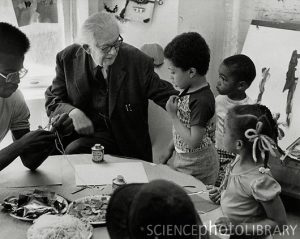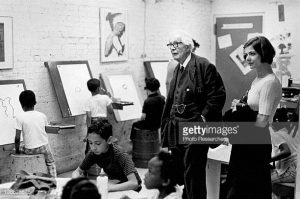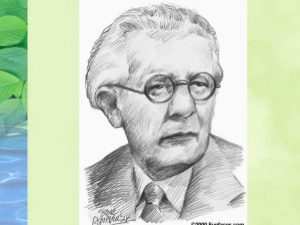心理学界では右の横綱はフロイド(Sigmund Freud)、左はスキナー(Burrhus Skinner)といえそうですが、認知心理学界の横綱といえばジャン・ピアジェ(Jean Piaget)であることに異論はでないでしょう。フロイドは精神分析学の大家でありますが、ピアジェも精神分析を研究した経緯があります。ともあれ子供の認知発達と発生的認識論を構成主義(constructivism) という枠組みで考えた希有の心理学者です。

Jean Piaget (1896-1980), the Swiss psychologist and philosopher, teaching children in a classroom. Much of his study of theories of human knowledge (epistemology) was based on how children’s minds develop. Piaget showed that children think in different ways to adults. He demonstrated that children’s misconceptions are often entirely logical if their limited knowledge is taken into account. Consequently, he thought that there is often more than one way of knowing something. He believed that children constantly build and test their own theories about the world. Piaget’s work led to the creation of scientific fields such as developmental psychology and cognitive theory.
 1896年にスイス(Switzerland)で生まれます。ノイエチャッテル大学 (University of Neuchatel)で中世の歴史を研究する父親の薫陶を受け、生物学など自然科学に関心の高い子供であったようです。15歳のとき、動物学の分野で発表した論文が高い評価を受けたという記録さえ残っています。
1896年にスイス(Switzerland)で生まれます。ノイエチャッテル大学 (University of Neuchatel)で中世の歴史を研究する父親の薫陶を受け、生物学など自然科学に関心の高い子供であったようです。15歳のとき、動物学の分野で発表した論文が高い評価を受けたという記録さえ残っています。
ノイエチャッテル大学で学位を得てから、パリ(Paris)へ移りそこで知能検査であるスタンフォードビネー検査 (Stanford–Binet Intelligence Scales) の開発でビネー(Alfred Binet)の下で働きます。スイスのジュネーブ(Geneva)に戻った後は、ルソー研究所(Rousseau Institute)の所長となります。
やがてジュネーブ大学(University of Geneva)やパリのソルボンヌ大学(Sorbonne University )で教えます。1955年にはジュネーブ大学内に国際発生認識センター (International Center for Genetic Epistemology)を創設します。その間、コーネル大学(Cornell University)やカリフォルニア大学バークレイ校(University of California, Berkeley)などでも講義しています。
生涯を終える1980年まで、発生認識センターの所長として研究に従事します。このセンターにおける華々しい活躍と多くの業績を指して周りの人々は「ピアジェの町工場」(Piaget’s factory)と呼んだほどです。我が国の発達心理の発展や教育界に及ぼしたピアジェの貢献は計りしれないものがあります。

